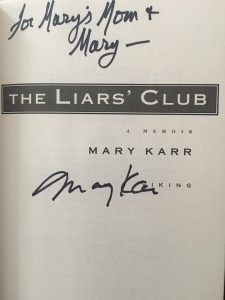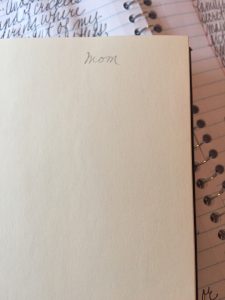All the Marys!
A few weeks ago on a Saturday night, I waited in line at the Marriott in downtown Lancaster for the chance to meet the renowned memoirist, Mary Karr. She had just finished the keynote address at HippoCamp 2016, the creative nonfiction conference sponsored by Hippocampus Magazine and organized by Donna Talarico-Beerman and company.
Anyone who aspires to write memoir will be told to read The Liars Club, the first of Mary Karr’s three memoirs. Karr pays attention to the details; the “carnality” of her language creates vivid and unforgettable stories. In both her speech and responses to questions from the audience, she revealed herself to be warm, feisty and human. I can’t believe I was afraid of her, but it’s true. I imagined she would have a low tolerance for emerging writers like me. I thought I was avoiding her memoirs until I was sure she wouldn’t frighten me out of my own aspirations.
Last fall, around the time I was published for the first time in the Oh, Baby! anthology from Creative Nonfcition’s In Fact Books, I heard Mary Karr interviewed on public radio, discussing her new book, The Art of Memoir. Her honesty and humor convinced me to approach her first through her teachings on craft. I read slowly, savoring her lessons, letting them take hold in my daily practice of morning pages. When I heard that she would be at HippoCamp 2016, I declared this the year of Mary Karr and spent the spring and early summer reading each of her memoirs in quick succession. I was ready to meet her. I had earned the privilege.
Happily alone in the autograph line, surrounded by the buzz of other conversations, my attention shifted between the lights of Penn Square and the people who wandered up and down the line, sipping drinks and looking for someone they knew, or perhaps, for someone they might like to know. Eventually, I reached the lit swap table and browsed awhile. My biggest concern was whether or not I would ask someone to take my picture with the author.
When I neared the front of the line, I flipped open both my books to the title page to make the signing move smoothly. That’s when, to quote from Mary Karr’s address, I was “ambushed by the truth.” On the flyleaf of The Liars Club, there was one handwritten word, Mom, a penciled whisper near the top of the page.
I hadn’t noticed the inscription when I read the book, didn’t remember it from any of the times I moved the hardcover from the shelves on one floor of the house to another. Mary Karr had just finished speaking about her difficult and much-loved mother, about whom she said she might be angrier if she were to write The Liars Club again. Now here was my mother, tangible to me in the surprise appearance of her tiny, handwritten claim to the book. I shifted in the line, as if making space for her presence.
While she was alive, I wrestled my mother for her approval; she couldn’t give it. Yet, even when we were at our most distant, books were our common language, the only gifts I could offer her that she wouldn’t hide in a closet and return later unused. We shared a fondness for mysteries and sleuthed alongside the likes of Spenser, Kinsey Millhone, Precious Ramotswe and Maisie Dobbs. From time to time, I would choose a story that I thought might resonate for both of us. After my time in jail in Guatemala, I used The Sweet Hereafter by Russell Banks, a novel that explores how people survive tragedy, to share with her something of what life felt like for me. Perhaps I meant The Liars Club to create another chance to connect.
I turned 40 the year the book was published; my mother was 71. I don’t know what made me think that she would want to read a book about a difficult childhood and a fraught mother/daughter relationship. Did I hope she would see something of her own life in the story, sandwiched as she was between a powerful mother and two stubborn daughters? Maybe I wanted to begin an honest conversation with her, now that I was a mother, too.
If she told me what she thought of the book, I don’t remember. The fact that I didn’t read it after she sent it back to me may simply mean that I was too busy being the mother of a three-year-old and the director of a small legal services program. But her inscriptions in the books I gave her usually included more: the year, my name, and the occasion for the gift. That single word, Mom, makes me think the story upset her, made her leery of claiming the book. That may be what I believed at the time, because I chose to leave it unread while my mother was alive.
I felt my mother at my elbow when I reached the front of the line. First, I offered up my copy of Lit, said my name was Mary, too. “Finally,” Mary Karr said as she wrote. “We’re a dying breed.” When I handed her The Liars Club, I told her the new version of how the book came to me, how I’d forgotten that I bought it for my mother, who is gone now, how I discovered she’d put her name in the book while waiting in line. When Mary Karr smiled at me, it seemed like she knew all about what lay beneath the few details I’d shared. “They may be gone,” I said, “but the relationship continues.” She laughed and inscribed the book “To Mary’s Mom & Mary.”
My head was crowded with Marys when I tried to fall asleep. Mary Karr, my mother, also Mary, and all the Marys I tried to be in the hope of making peace with my mother. During her address, Mary Karr told us that when writing memoir we should “save our harshest judgments for ourselves.” Here’s mine: I wish I had been strong enough to figure out a way to bridge the gap between my mother and me before she died.



Gail Priest
This is most touching, Mary. It’s beautifully written. Yes, they are gone, but the relationship continues.
I can relate to the mother/daughter relationship, and realize that with my plays and novels, I have attempted to work it out between my characters and their mothers. The mothers are wiser by my last novel, and I hope it means I’ve come to a more peaceful place. When I think about my own mom, who passed twenty-one years ago this month, I envision her in a spiritual place where she is free of pain and depression. In this state, she can smile down on me with pride and approval. I hope you’ll find peace with your mother.
maryscherf
Thanks, Gail. I am working my way to what I hope will be a peaceful place as well. Spending the last days of August in Annie Crow Knoll! Looking forward to the growing wisdom of your characters and to reviewing and spotlighting them in the weeks ahead.
Cindi
Oh, Mary I want to write, “I wish I had been your mother”, but that would sound like sci-fi. We don’t share that genre. Your writing is precious, and fragile and strong.
maryscherf
Oh, Cindi, thank you for that wish. My mother did the best she could. I am who I am because of all that she gave and withheld. I am grateful you are my friend, and a believing mirror for my writing.
Donna
Mary – I was so happy to find this post. I hadn’t seen it until now. This is beautiful, and what an incredible moment. Thank you for sharing this with us. – Donna
maryscherf
Thanks, Donna. That was an amazing night at a wonderful conference. Can’t wait to see what’s in store for HippoCamp 2017.